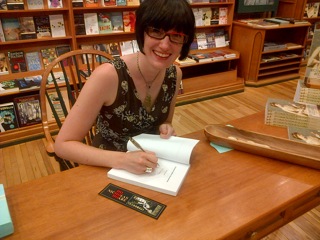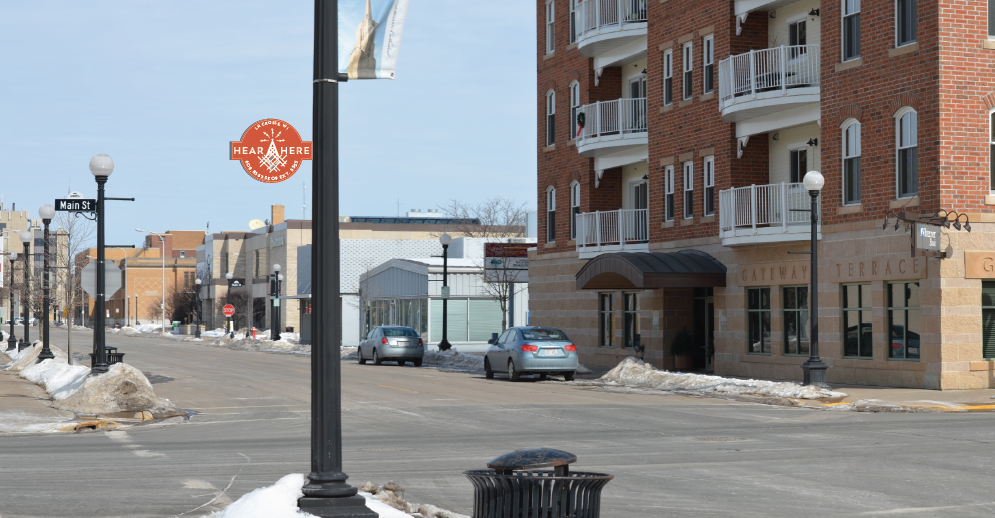Posted 12:41 p.m. Thursday, April 17, 2014
A new UW-La Crosse class is open to anyone interested in uncovering the untold, personal stories that make La Crosse’s history rich.
 UW-L Assistant Professor Ariel Beaujot, who started teaching at UW-L in August 2012, has developed a new history course open to students and community members interested in uncovering more La Crosse history.[/caption]
A new UW-La Crosse class is open to anyone interested in uncovering the untold, personal stories that make La Crosse’s history rich.
UW-L Assistant Professor Ariel Beaujot will offer HIS 393 in fall 2014 and HIS 403 in spring 2015. The class is open to UW-L students and community members interested in learning how to record, edit and package oral histories. In April 2015, the class will launch a location-based mobile phone system that documents La Crosse history in the downtown area.
Students will erect street-level signs where people can call a toll-free number to access someone’s personal story related to that particular location. The project is based on an idea called “psychogeographic walking.” Just as a smell can remind people of a certain memory, walking through a place can trigger memories too, notes Beaujot.
Beaujot aims to have “intimate, neighborhood-level voices” tell everyday stories that make up La Crosse, but are often overlooked in history. Beaujot and her students will eventually recruit diverse community members to serve as storytellers such as: La Crosse residents, visitors, students, local business owners, semi-homed or homeless people, as well as the LGBT community, the Hmong community and the Ho-Chunk Nation.
Beaujot is looking for original stories. Typical La Crosse history focuses on the same age-old tales starting with the Native Americans who played lacrosse, and continuing with the city’s founder Nathan Myrick, the lumber barons who lived Cass Street and department stores that once lined the booming downtown, notes Beaujot.
“Those are the stories we tell about our city,” she says. “We don’t tell the stories of the people — the stories of the average man and woman. That’s what this project does.”
[caption id="attachment_32979" align="aligncenter" width="995"]
UW-L Assistant Professor Ariel Beaujot, who started teaching at UW-L in August 2012, has developed a new history course open to students and community members interested in uncovering more La Crosse history.[/caption]
A new UW-La Crosse class is open to anyone interested in uncovering the untold, personal stories that make La Crosse’s history rich.
UW-L Assistant Professor Ariel Beaujot will offer HIS 393 in fall 2014 and HIS 403 in spring 2015. The class is open to UW-L students and community members interested in learning how to record, edit and package oral histories. In April 2015, the class will launch a location-based mobile phone system that documents La Crosse history in the downtown area.
Students will erect street-level signs where people can call a toll-free number to access someone’s personal story related to that particular location. The project is based on an idea called “psychogeographic walking.” Just as a smell can remind people of a certain memory, walking through a place can trigger memories too, notes Beaujot.
Beaujot aims to have “intimate, neighborhood-level voices” tell everyday stories that make up La Crosse, but are often overlooked in history. Beaujot and her students will eventually recruit diverse community members to serve as storytellers such as: La Crosse residents, visitors, students, local business owners, semi-homed or homeless people, as well as the LGBT community, the Hmong community and the Ho-Chunk Nation.
Beaujot is looking for original stories. Typical La Crosse history focuses on the same age-old tales starting with the Native Americans who played lacrosse, and continuing with the city’s founder Nathan Myrick, the lumber barons who lived Cass Street and department stores that once lined the booming downtown, notes Beaujot.
“Those are the stories we tell about our city,” she says. “We don’t tell the stories of the people — the stories of the average man and woman. That’s what this project does.”
[caption id="attachment_32979" align="aligncenter" width="995"] Image of what the toll-free phone system would look like.[/caption]
After people listen to a story using the toll-free phone system, they will have the option to leave their own story. These will be reviewed by a board and possibly included in the project in the future. Students will also create a website where stories can be heard and contributed.
“Once heard, these stories can change the way people think about their city because they see their part in the larger historical narrative,” says Beaujot, “In listening to other people's experiences, community members will deepen their understanding of the city and each other.”
HIS 393 and HIS403 are some of the first classes to be offered in UW-L’s new public and policy history major. The major aims to train people to learn the skills to work in a field that values history such as oral history, museum studies, archival studies or government work related to public policy and history.
Image of what the toll-free phone system would look like.[/caption]
After people listen to a story using the toll-free phone system, they will have the option to leave their own story. These will be reviewed by a board and possibly included in the project in the future. Students will also create a website where stories can be heard and contributed.
“Once heard, these stories can change the way people think about their city because they see their part in the larger historical narrative,” says Beaujot, “In listening to other people's experiences, community members will deepen their understanding of the city and each other.”
HIS 393 and HIS403 are some of the first classes to be offered in UW-L’s new public and policy history major. The major aims to train people to learn the skills to work in a field that values history such as oral history, museum studies, archival studies or government work related to public policy and history.
The broad themes for story collecting and interpretation will be:
- Leisure, tourism, entertainment
- Cityscapes, architecture, malls, consumption
- Roads, neighborhoods, communities
- Work, skill, unionization
- Sex, sexuality, love, domesticity
- Immigration, emigration, displacement
- Social services, philanthropy, poverty
- Nostalgia, childhood, memory
